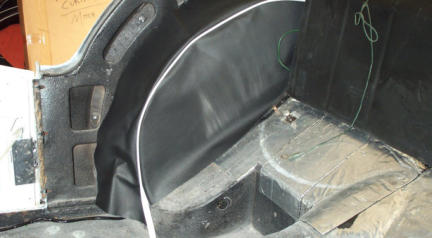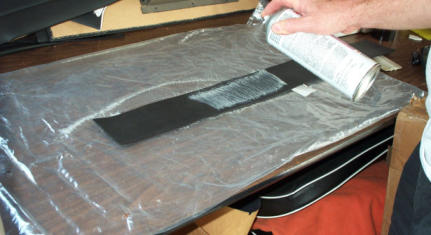



© 2018-2025 - Macy’s Garage, Ltd.
Macy’s Garage

America’s BEST Triumph Shop
WHEEL-ARCH COVERS
Wheel-Arch Cover Installation
Installing the rear wheel arch cover upholstery in TR2-TR6 sports cars can be done by any Triumph owner who wishes to install his own interior, but requires care and planning to accomplish without wrinkles and bubbles. These covers should be the first pieces to go into your new interior, and whether they look "right" or not will set the tone for your whole interior installation. Follow along as we install a pair of these covers in a TR3A.
The first thing to consider is the padding under the new covers. If you received this thick
"carpet padding" for under your wheel arch covers, THROW IT AWAY! Triumph TR2-3B had
a THIN pad on the top surface only, and TR4-6 wheel arches are completely padded (but it
should all be THIN!). This Jute style carpet pad is close to 1/4” thick, and too loosely woven
to hold the covers tightly to the wheelarches.
Here's a comparison of the thick carpet pad (bottom), and a more appropriate 1/8" thick
"landau top pad". The landau top padding should be available locally from any auto trim
shop, or from the macysgarage.com "parts" page. The 1/8" thick pad will more closely
resemble the original padding thickness, and it’s dense enough to hold the wheel arch covers
in place without pulling loose and wrinkling.
There is a difference between the left and right wheel arch covers, so before you go too far,
lay them loosely in place and make sure you know which side is which!
Also inspect your wheel arches, and make sure there are no big bumps or dents. The thin
padding (or no padding in the case of TR2/3 inner sides) will not hide any imperfections in
your panels.
Carefully fold the narrow top section back without shifting the cover position, and mark the
location of the seam on the wheel arch.
I've let the cover drop away so that you can see the chalk line indicating where the seam will
lay when the cover is installed. This should be close to the center of the small curved radius
of the wheel arch.
A good spray contact adhesive will be necessary to install your covers. I prefer 3M #08088,
and it needs to be applied to both surfaces. Here I'm spraying the padding for the top of the
TR3A wheel arch cover.
Spray a good coating of glue where the pad will attach to the wheel arch. Wait for the glue to
dry 4-5 minutes before installing the pad.
Don't let the pad touch the wheel arch until you have it in the correct position. Once they
touch, it's there to stay! Also be careful that the padding does not fold over and touch itself.
This “contact adhesive” does indeed adhere “on contact”!
Smooth out all wrinkles as you go because you won't get a second chance. If you're doing a
fully padded TR4-6 wheel arch, install the side padding in the same manner, but leave a 1/2"
gap between the top and side padding for the seam material & piping to lay in.
Use a single edge razor blade to trim the excess padding from the outside edge of the wheel
arch. You can also use a utility knife or an X-Acto knife, but make sure the blade is sharp so
that you do not snag and tear the padding.
Peel away any excess padding which might extend "up" above the wheel arch.
Spray glue to the inner side of the wheel arch (on top of the padding for TR4-6), and to the
side of the cover. As always, allow to dry slightly before proceeding.
CAREFULLY position the cover so that the seam and piping are along the line (from photo
#4), and stretch to smooth all wrinkles as you go. A second set of hands to hold the cover
out and away from touching the wheel arch until it's in position will be a tremendous help.
Remember that part about “adhering on contact”? If you let it touch before it’s fully in position,
it’s going to stick!
Fold the top of the cover back and apply glue to the cover and the padding. Don't be too
concerned with glue overspray, as it can be easily wiped off (without damage to leather or
vinyl) using old fashioned lighter fluid.
Pull the cover top over the padding and into position. I like to start in the center, and "roll" the
top section into place, pulling and stretching slightly as I go. As before, you'll only get 1
chance at this, so work slowly and watch for the wrinkles and bubbles that will try to form,
and smooth them out as you go.
Trim in the corners and around the edges so that the excess cover will lay flat against the
floor. Leave the excess in place so that there won't be any visible gaps when the carpet is
installed.
Completed wheel arch, ready to receive the surrounding interior trim. (You might have
noticed from the sloping rear floor that this is a Pre-TS60000 car.) You will need to trim
around the corner of the floor on Post-TS60000 cars, and all TR4-TR6 cars.
And here's the completed interior with the optional "Occasional Rear Seat" installed. Smooth
and wrinkle free wheel arches with just the right amount of padding sure look good!

























© 2018-2025 - Macy’s Garage, Ltd.
Macy’s Garage


America’s BEST Triumph Shop

Wheel-Arch Cover Installation
Installing the rear wheel arch cover upholstery in TR2-TR6 sports cars can be done by any Triumph owner who wishes to install his own interior, but requires care and planning to accomplish without wrinkles and bubbles. These covers should be the first pieces to go into your new interior, and whether they look "right" or not will set the tone for your whole interior installation. Follow along as we install a pair of these covers in a TR3A. Captions are below each pic.
The first thing to consider is the padding under the new
covers. If you received this thick "carpet padding" for under
your wheel arch covers, THROW IT AWAY! Triumph TR2-3B
had a THIN pad on the top surface only, and TR4-6 wheel
arches are completely padded (but it should all be THIN!).
This Jute style carpet pad is close to 1/4” thick, and too
loosely woven to hold the covers tightly to the wheelarches.
Here's a comparison of the thick carpet pad (bottom), and a
more appropriate 1/8" thick "landau top pad". The landau top
padding should be available locally from any auto trim shop,
or from the macysgarage.com "parts" page. The 1/8" thick
pad will more closely resemble the original padding thickness,
and it’s dense enough to hold the wheel arch covers in place
without pulling loose and wrinkling.
There is a difference between the left and right wheel arch
covers, so before you go too far, lay them loosely in place and
make sure you know which side is which!
Also inspect your wheel arches, and make sure there are no
big bumps or dents. The thin padding (or no padding in the
case of TR2/3 inner sides) will not hide any imperfections in
your panels.
Carefully fold the narrow top section back without shifting the
cover position, and mark the location of the seam on the
wheel arch.
I've let the cover drop away so that you can see the chalk line
indicating where the seam will lay when the cover is installed.
This should be close to the center of the small curved radius
of the wheel arch.
A good spray contact adhesive will be necessary to install
your covers. I prefer 3M #08088, and it needs to be applied
to both surfaces. Here I'm spraying the padding for the top of
the TR3A wheel arch cover.
Spray a good coating of glue where the pad will attach to the
wheel arch. Wait for the glue to dry 4-5 minutes before
installing the pad.
Don't let the pad touch the wheel arch until you have it in the
correct position. Once they touch, it's there to stay! Also be
careful that the padding does not fold over and touch itself.
This “contact adhesive” does indeed adhere “on contact”!
Smooth out all wrinkles as you go because you won't get a
second chance. If you're doing a fully padded TR4-6 wheel
arch, install the side padding in the same manner, but leave a
1/2" gap between the top and side padding for the seam
material & piping to lay in.
Use a single edge razor blade to trim the excess padding from
the outside edge of the wheel arch. You can also use a utility
knife or an X-Acto knife, but make sure the blade is sharp so
that you do not snag and tear the padding.
Peel away any excess padding which might extend "up"
above the wheel arch.
Spray glue to the inner side of the wheel arch (on top of the
padding for TR4-6), and to the side of the cover. As always,
allow to dry slightly before proceeding.
CAREFULLY position the cover so that the seam and piping
are along the line (from photo #4), and stretch to smooth all
wrinkles as you go. A second set of hands to hold the cover
out and away from touching the wheel arch until it's in position
will be a tremendous help. Remember that part about
“adhering on contact”? If you let it touch before it’s fully in
position, it’s going to stick!
Fold the top of the cover back and apply glue to the cover and
the padding. Don't be too concerned with glue overspray, as
it can be easily wiped off (without damage to leather or vinyl)
using old fashioned lighter fluid.
Pull the cover top over the padding and into position. I like to
start in the center, and "roll" the top section into place, pulling
and stretching slightly as I go. As before, you'll only get 1
chance at this, so work slowly and watch for the wrinkles and
bubbles that will try to form, and smooth them out as you go.
Trim in the corners and around the edges so that the excess
cover will lay flat against the floor. Leave the excess in place
so that there won't be any visible gaps when the carpet is
installed.
Completed wheel arch, ready to receive the surrounding
interior trim. (You might have noticed from the sloping rear
floor that this is a Pre-TS60000 car.) You will need to trim
around the corner of the floor on Post-TS60000 cars, and all
TR4-TR6 cars.
And here's the completed interior with the optional
"Occasional Rear Seat" installed. Smooth and wrinkle free
wheel arches with just the right amount of padding sure look
good!




































